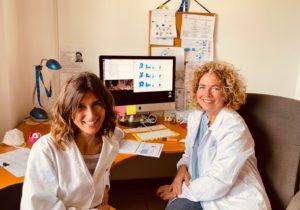Study of natural killer cells in A-T pathogenesis and their therapeutic implications
Research Project information
Principal researchers: Dr Margherita Doria (right) and Dr. Maria Giovanna Desimio
Institute: Bambino Gesù Children’s Hospital, Italy
Cost: £91,000 over 24 months in partnership with the A-T Society (UK), AEFAT (Spain) and BrAshA-T (Australia)
Start Date: 1st of November 2022 (No-cost extension until 31st of December 2025 granted in March 2025)
What are the researchers proposing to do?
The aim of this project is to identify alterations in blood immune cells of people with A-T that could serve as predictors of cancer development and targets of novel anti-cancer immunotherapies. By studying a small group of A-T patients, the team at the Bambino Gesù Children’s Hospital (Rome, Italy) recently identified some defects in cells of the innate immune defence against tumours and viruses that are called ‘natural killer’ (NK) cells. Specifically, A-T NK cells showed features that are typical of ‘exhausted’ cells and displayed reduced expression and function of the activating NKG2D receptor correlated with the increase of its ligands (NKG2DLs) in the plasma of patients. The expression of NKG2DLs, normally absent, is induced by tumorigenic transformation, infection and, in general, when cells undergo a ‘stress’, a condition that typically occur in A-T due to genetic defects of the ATM enzyme. The present study aims to verify the hypothesis that persistent engagement of stress-induced NKG2DLs may result overtime in NKG2D down-regulation and, consequently, in the loss of anti-tumor and anti-viral efficacy of NK cells during A-T disease progression
Why?
Individuals with A-T are at higher risk of developing leukemias and lymphomas in the first two decades of life and of solid organ malignancies as they get older. In A-T, the loss of several distinct ATM functions beyond maintenance of genome stability has been linked to cancer development, though results are controversial. There is currently no way to predict which patient will develop a malignancy and treatment of cancer is challenging due to patient’s increased sensitivity to chemo/radiotherapy. Therefore, a greater understanding of cancer pathogenesis and its biomarkers as well as new therapeutic treatments are urgently required.
How will the research be done?
The team will perform a 2-years longitudinal study in A-T patients and in control healthy individuals, using blood samples to analyze NK-cell phenotype and function, NKG2DL expression, as well as the presence of immunomodulatory, inflammatory, and oxidative stress factors. The NKG2D/NKG2DL axis will be investigated in a specific ATM-deficient mouse. Finally, NK-cell enhancing products will be tested on NK cells of A-T patients.
How could it make a difference to the lives of those affected by A-T?
There will be no immediate benefits to patients with A-T, but results of this study may help the development of cancer predictive tests and provide an important building block for the design of innovative strategies to lengthen and improve lives. A major goal of this study is to identify non-invasive markers (measured in a blood sample) that could predict the risk of cancer, thereby functioning as indicators for malignancy screening without delay and, eventually, for early cancer treatment. Novel biomarkers integrating those already put forward can be of great use for the clinician in the management of A-T patients and help the identification of individuals at highest risk of cancer to be frequently monitored and considered for emerging treatment options. In addition, the proposed definition of NK cell defects in A-T may pave the way to novel NK-cell therapeutic approaches against cancer in A-T patients.




